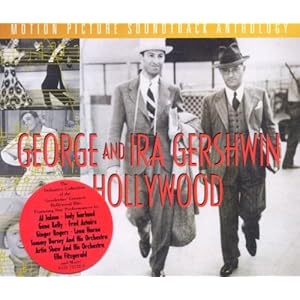Home » Jazz Musicians » Ira Gershwin
Ira Gershwin
Ira Gershwin was born in New York City, the son of a Russian Jewish immigrant, on December 6, 1896. The older brother of George Gershwin, he attended Townsend Harris High School in New York City where one of his closest friends and fellow students was E.Y. “Yip” Harburg. The two worked together writing lyrics and Ira started his career in 1918 under the pen name of Arthur Francis. It was not until 1924 that Ira and George began a collaboration that would prove one of the most successful and prolific in history. Their first collaborations were for Broadway: Lady, Be Good! (1924, including "Fascinating Rhythm" and, although it was cut from the show, "The Man I Love"), Tip Toes (1925, including "Sweet and Low Down"), Oh Kay! (1926, including "Clap Yo' Hands", "Do-Do-Do", "Maybe", and "Someone To Watch Over Me"), Funny Face (1927, including '"S Wonderful"), Rosalie (1928, including "How Long Has This Been Going On"), Show Girl (1929, including "Liza"), Strike Up the Band (1930, including "I've Got A Crush On You" and "Soon"), Girl Crazy (1930, including "But Not For Me", "Embraceable You", "Bidin' My Time", and "I Got Rhythm"), Delicious (1931, including "Blah Blah Blah. "), Of Thee I Sing (1931, the first musical to win the Pulitzer Prize and which included "Of Thee I Sing", "Love Is Sweeping The Country", and "Who Cares"). In 1931, the two brothers headed to Hollywood producing a score for Fox Studios, Delicious, starring Janet Gaynor. They returned to New York again working on Broadway producing Pardon My English (1933, including "Isn't It A Pity" and "Lorelei") and Let 'Em Eat Cake (1933, including “Mine”). . In 1935, Ira, in collaboration with Dubose Heyward, wrote the words to George Gershwin's music for Porgy and Bess, a work that straddles the world of opera and Broadway and includes such classic songs as "Summertime", "Bess, You Is My Woman Now", "It Ain’t Neccessarily So" and "I Got Plenty O' Nuthin"'. Many consider it the greatest American opera written to date. In 1937, Ira and George accepted a contract from RKO and headed back to Hollywood. Among the movies they wrote scores for were Shall We Dance (1937, which included such classic songs as "They All Laughed", "Let's Call the Whole Thing Off', and "They Can't Take That Away From Me"), A Damsel in Distress (1937, included "Things Are Looking Up", "A Foggy Day", "Nice Work If You Can Get It", and "I Can't Be Bothered Now").
Read moreTags
Photos
Music
Recordings: As Leader | As Sideperson




















